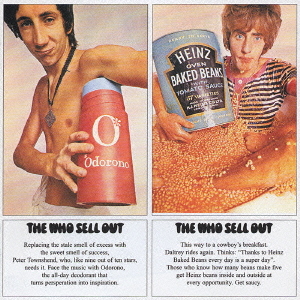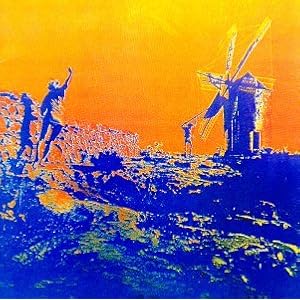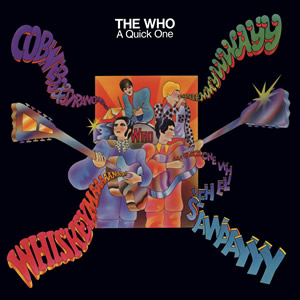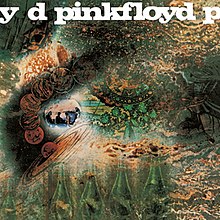THE WHO: THE WHO SELL OUT (1967)
14/15
1. Armenia City In the Sky; 2. Heinz Baked Beans; 3. Mary Anne with the Shaky Hand; 4. Odorono; 5. Tattoo; 6. Our Love Was; 7. I Can See For Miles; 8. I Can't Reach You; 9. Medac; 10. Relax; 11. Stilas Stingy; 12. Sunrise; 13. Rael; [bonus tracks]: 14. Rael 2; 15. Glittering Girl; 16. Melancholia; 17. Someone's Coming; 18. Jaguar; 19. Early Morning Cold Taxi; 20. In the Hall of the Mountain King; 21. Girl's Eyes; 22. Mary Anne with the Shaky Hand (Electric Version); 23. Glow Girl
Best song: I CAN SEE FOR MILES
(note: I have the 1995 single-disc reissue, there's a 2009 double-disc "deluxe edition" with different bonus tracks, although no new actual songs)
One thing that really strikes me about The Who's '60's albums is just how freaking fun they are to listen to. While I love the band's later works, sometimes it seems that Pete was so concerned about making his Big Artistic Statement that he forgot to enjoy making music. Of course, the crippling depression and alcoholism probably didn't help much, either, but that's for later. For now, though, they're still a band with a great sense of fun, and even though this album might not have the sheer number of all-time Who classics later ones would (although there definitely is one here), I still find myself wanting to listen to it just as much.
First, an explanation of the concept of the album is necessary. Once again, the band found themselves strapped for cash, which really isn't a surprise seeing as a big part of their live act was destroying Pete and Keith their instruments at the end of the show, not to mention that God knows how much management had to pay to hotel chains after Keith blew up their toilets. Thankfully, this time the band found a solution that didn't involve having Roger Daltrey write songs--they decided instead to do commercial jingles, and thus did The Who sell out. Now, personally, I have no idea why the fact that a band is doing commercials somehow makes their music less enjoyable, but apparently this really pissed some people off. The band's response, then, was this album, which was presented as a "pirate radio" show, complete with fake commercial jingles, mostly written by John and Keith while they were drunk in a pub one night. While all of the jingles on the actual original album were written specifically for the album, some of the ones interspersed in the bonus tracks were the actual jingles they recorded as commercials, and they're pretty cool. Now, this is clearly an awesome concept for an album, and now it's impossible for me to imagine most of these songs without the jingles surrounding them, but that would mean dick if the band didn't come through with the actual songs, and thankfully, they did.
The opening song, "Armenia City in the Sky" hardly sounds like a typical Who number, being quite psychedelic in nature, but that's because the band didn't write it--roadie John Keen, later of the one-hit wonder band Thunderclap Newman ("Something In the Air"), did. It may be atypical, but it's still an excellent song, and Entwistle does a nice job with the psychedelic horns, and it's easy to see why the group decided to. The big winning section on the album is a four-song stretch in the middle, with some of Pete's best writing to date. Live favorite "Tattoo" is great in any form, even if it is not quite as powerful here than it would be on Leeds, but since studio Who and live Who were two different entities anyway that's hardly an issue. "Our Love Was" and "I Can't Reach You," then, are both fantastic acoustic-based songs with great melodies and some nice singing from Pete, whose tender vocals are better-suited to this kind of song than Roger's yowls. Great guitar solo on "Our Love Was," too.
Of course, everything else on the album pales in comparison to the big masterpiece, which is, of course, "I Can See For Miles." Everything about the song is great--easily Roger's best vocals on the album, and then there's Keith's drumming. Oh my God, Keith's drumming on that song is just fan-fucking-tastic, and even if it were the only song he'd ever played on he would still be worthy of being considered a legend. I'm not sure if this or "Won't Get Fooled Again" is my favorite performance from him, but either way it's in my top 10 drum songs of all time, were I ever to make such a list. Too bad they never performed it live until after Keith died (if you wanna hear just how much he makes the song, try listening to a later version--great song, of course, but it's just not the same). Oh, and Pete plays a great solo in the middle and the harmonies are fantastic in the "Eiffel Tower" section. Just a masterful work all and all.
The other material is nothing to sneeze at, either. "Heinz Baked Beans" and "Medac" are both funny fake ads from John (especially love the return of the Boris voice in the former), and the Pete-sung "Odorono" is, without a doubt, the best two-and-a-half minute deodorant advertisement I've ever heard. What really makes it work is that it starts out as a normal song...it's not until the very end that you realize it's a dorky deodorant ad! Hell, it still manages to confuse me sometimes. Unfortunately, the album manages to sag a bit towards the end, as the concept seems to sort of peter out. "Relax" is an alright acid rocker, and John's "Silas Stingy" is fun if rather throwaway, but the admittedly pretty "Sunrise" has never managed to do anything for me, and rock opera attempt #2, "Rael," is a bit of a mess. True, it does have the first appearance of the "Sparks" guitar line, but I can't follow what's supposed to be going on here at all--it's way too long to work as a simple pop song, but way too short to work as a full-fledged rock opera. Now, if I was alive back in the 60s and bought this on vinyl, I would probably end this review by complaining about how the album starts out great, but ends on a relatively low note, and wonder why they couldn't keep the concept going until the end.
Thankfully, though, the CD reissue remedies that issue, and since interspersing the real-life advertisements throughout basically makes it seem like Side 3 of the album, the sag in what's now the middle is hardly an issue. Not to mention that most of these tracks are fucking excellent, and more than worthy of being included. My favorite among the bonus tracks is John's "Someone's Coming," sung by Roger and featuring a great horn-led melody. Keith's "Girl's Eyes" also has a surprisingly top melody, and even Roger manages to attach his name to something good on "Early Morning Cold Taxi." Turns out he didn't actually write it, but he and guitar tech Dave Langston were planning on entering some sort of Lennon/McCartney partnership, but it never actually pained out. Shame, because if this song is any indication, Langston was a strong writer with a good sense of melody. If nothing else, Roger should have brought him back to help out on his solo albums as opposed to some of the shit he recorded. I'm also quite fond of the band's take on "Hall of the Mountain King" by way of "Interstellar Overdrive," and Roger's singing on "Melancholia" is some of his best to date. Finally, "Glow Girl," about being a passenger on a plane that's going down, works MUCH better as an album closer than "Rael" did, and of course features the proto-Tommy closing line of "It's a girl, Mrs. Walker, it's a girl." Seriously, get this album. It shows a bit of a different side to the band than their later stuff would, but it's every bit as worthwhile. Highly recommended.




